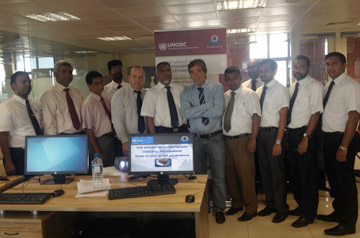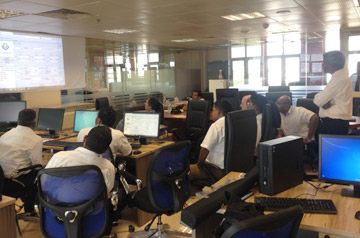|
Port Control Unit to fight drug menace:
Sophisticated Cargo Targeting System to detect narcotics
By Kurulu Kariyakarawana
Smuggling narcotics into the country is a grave issue faced by law
enforcement authorities stationed at airports and seaports. Up to 2004,
smuggling of dangerous drugs like heroin was limited to the Bandaranaike
International Airport where persons were nabbed with the contraband
hidden in their baggage. But a five kilogram detection of heroin hidden
in a pounding machine that arrived at the Colombo port in the same year
and two attempts to smuggle in 70 kilograms of heroin concealed in
carefully crafted plastic potatoes in 2009 and 2010 proved that
narcotics could easily be brought in by sea cargo too.
|

Athula Lankadeva |
This posed a fresh threat to the Sri Lanka Customs which was focusing
only on individuals carrying narcotics through airports, had to now
increase vigilance and intelligence at seaports too, where a bulk of
narcotics were beginning to arrive in containers hidden among various
other trading goods. Unlike subjecting each and every suspicious
passenger who travels through an airport to check for drugs, searching
every container which arrives at the port among several thousand a day
is impractical and a near impossible task.
Global
To address this issue faced by the Customs units in many countries,
the World Customs Organisation (WCO) jointly with the United Nations
Office on Drugs and Crime (UNODC) initiated a global Container Control
Programme (CCP). This is a program to assist governments to establish a
sustainable enforcement structure in selected seaports to minimise the
risk of maritime containers being exploited for trafficking in various
illicit goods.
These illicit goods were not only narcotics but firearms, precursor
chemicals for drugs and weapons, nuclear material, weapons of mass
destruction and other forms of organised crime activity.
 |
|
Technical experts, Peter
Timmermans and Cesar Schiaffino at the new Port Control Unit |
 |
|
Officers of the Port
Control Unit at a training session |
With the sheer volume of approximately 500 million containers being
shipped annually in the international maritime container traffic, it is
difficult to make a successful detection especially when sophisticated
and ingenious concealment methods along with complex routines being
adopted by smugglers and illicit drug traffickers. The WCO believes that
seaports are notoriously difficult and at times dangerous places to
work, as law enforcement bodies are often hampered by a lack of
resources, complex port processes and systems as well as inter-agency
mistrust which are exploited by smuggling organisations.
According to the CCP, Port Control Units will be set up in every
recognised high risk seaport. These Port Control Units will comprise
analysts and search teams from different law enforcement agencies like
Customs and the Police. A group of carefully selected officers will be
trained and equipped to work together to systematically target high risk
containers for professional law enforcement scrutiny with minimum
disruption to the free flow of legitimate trade.
Functions
The CCP was established in 2004 in the port of Guayaquil in Ecuador
and it successfully functions in 50 strategically important and high
risk seaports in 19 countries leading to significantly increased
detections of drugs and other illicit goods. Colombo is among the few
latest ports to embrace this new program in 2013 with ports in the
Maldives and Karachi also following suit.
Customs Deputy Director Narcotics and Port Control, Athula Lankadeva
said the Sri Lanka Customs was eagerly awaiting a solution to the
narcotic issue which has gone beyond the limit as soon as they came to
know of the Container Controller Program developed by the WCO and UNODC.
Upon a request made by us to initiate this program in Sri Lanka, a team
of specialists representing UNODC visited the country in March 2013 to
conduct a study and assessment of requirements for the launch. Wide
discussions were held between foreign representatives, Customs
officials, officers of the Police Narcotic Bureau and representatives of
the National Dangerous Drugs Control Board to understand how to initiate
a Port Control Unit to investigate narcotic smuggling activities. In the
UNODC annual meeting held in New Delhi in the latter part of May 2013,
the formal approval to launch the CCP in Sri Lanka was granted. Several
tasks such as preparation of agreements, procedure and coordination with
UNODC were involved in preparation to launch the program.
A skeleton staff of four officers was appointed for this purpose in
July 2013, while allocating office space for setting up the
investigation unit called the Port Control Unit under the CCP.
Officers to the Port Control Unit were nominated and the first
training program was held in the last two weeks of January this year by
UNODC and WCO. During this training, a group of international Customs
experts in container examination, explained how containers carrying
narcotics should be targeted and transnational crimes using shipping
documents while using information technology tools and open source tools
such as those available on the Internet.
The second phase of the training session or the practical session of
the CCP commenced last week with the arrival of two Technical Experts
from the UNODC – WCO Container Control Program Compliance and
Facilitation Directorate, Peter Timmermans and Cesar Schiaffino. The
training will equip officers to start operations straight away and
altogether 15 officers were appointed to man the Port Control Unit which
would be necessary in the future to continue the service undisturbed.
These specially trained officers could also obtain the services of the
Ports Authority, Police Narcotics Bureau and National Dangerous Drugs
Control Board when necessary.
Draft Regulations for Advance Sea Cargo Reporting
Customs Ordinance (Chapter 235) No. 17 of 1956*
I, Mahinda Rajapaksa, the President of Sri Lanka, in my capacity as
the Minister of Finance and Planning by virtue of the powers vested in
me by Sections 103 of the Customs Ordinance as amended by Act No. 9 of
2013, do hereby order the following regulations shall come into effect
from the midnight of 14th June 2014.
Regulations
These regulations may be cited as the Electronic Sea Cargo Reporting
Regulations No. 1 of 2014 and shall come into operation from 15th of
June 2014. (hereinafter referred to as “the date of operation”)
For the purpose of these regulations the term “cargo reporter”
shallinclude Shipping Agents, Non Vessel Operating Common Carriers (NVOCC),and
freight forwarders.
*Registration of Cargo Reporters*
Shipping Agents, Non Vessel Operating Common Carriers (NVOCC), and
freight forwarders who hold licenses issued by the Directorate General
of Merchant Shipping are eligible to register with Customs for reporting
cargo electronically. Such cargo reporters shall submit the prescribed
application forms for registration to the ICT Division of Sri Lanka
Customs and obtain a registration number and user credentials to access
the customs computer system, in order to submit cargo reports
electronically.
Validity period of the registration is limited to 2 years from the
date of registration. Cargo reporters those who currently hold
registration with Customs, shall renew their registrations after 2 years
of the date of operation of the regulations.
The registration of a cargo reporter can be cancelled or suspended,
or any application for registration or renewal registration may be
refused by the Director General of Customs, if he has reasonable grounds
to do so.
[Part 2]
Inward Cargo reports
This section applies to a ship in respect of a voyage to Sri Lanka
from a place outside Sri Lanka.
If the ship is due to arrive at its first port in Sri Lanka since it
last departed from a port outside Sri Lanka, each cargo reporter shall
report to Customs electronically, particulars of all goods that the
cargo reporter has arranged to be carried on the ship on the voyage and;
(a) That are intended to be unloaded from the ship at a port in Sri
Lanka (whether the first port or any subsequent port on the same
voyage); and/or
(b) That are intended to be kept on board the ship for shipment on to
a place outside Sri Lanka.
A cargo report is to be made not later than:
(i) the start of the 72 hour period before the arrival in the first
port of call in Sri Lanka ; or
(ii) if the duration of voyage from the last port is less than 72
hours,on the departure from the last port outside Sri Lanka.
Part 3
Outward Cargo reports
This section applies to a ship in respect of a voyage from Sri Lanka
to a place outside Sri Lanka.
If the ship is due to depart from its last port in Sri Lanka, each
cargo reporter must report to Customs electronically, particulars of
export cargo that the cargo reporter has arranged to be carried on the
ship on the voyage.
A cargo report as per regulation 11 above is to be made before
seeking outward clearance for the voyage.
Report Formats
The electronic cargo reports mentioned in Regulation 6 and 9 shall be
communicated in the prescribed format for the level of reporting as set
out on the Customs website.
The Director General of Customs may prescribe different formats for
the cargo reports to be made by different categories of cargo reporters
Contraventions
A cargo reporter who contravenes any of the regulations 6, 7, 9 and
10 (outside the general/further moratorium period) by failing to submit
the information required or by submitting any forged, altered,
incomplete, incorrect or false information commits an offence
punishable, and shall become liable to a penalty not exceeding One
Hundred Thousand Rupees.
Moratorium Period
The General Moratorium Period is the period of first month of the
date of commencement of operation of these regulations.
If:
(a) a cargo reporter applies to the Director General of Customs for
thegrant to the cargo reporter of a further moratorium period to have
effectat the end of the general moratorium period;
(b) the Director General of Customs is satisfied that the cargo
reporter has, within the general moratorium period, made reasonable
progress in:
(i) installing the facilities required for the making of electronic
cargo reports; or
(ii) in putting in place business practices or entering into business
arrangements to enable the making of electronic cargo reports; the
Director General of Customs may grant to such cargo reporter a *further
moratorium period* of not more than 1 month beginning at the end of the
general moratorium period. |
Speaking to the Sunday Observer, UNODC – WCO Technical Expert, Peter
Timmermans said that the CCP was a successful program in the world
operating in 19 countries in 50 high risk seaports worldwide for the
past decade. Since its inception in the port of Guayaquil in Ecuador to
the latest port of Karachi . Customs officials around the world have
seized 85 tonnes of cocaine in the past ten years along with large
quantities of other illicit goods being attempted to be smuggled from
port to port. He said the training session in Sri Lanka was a success
and that they were looking forward for the local authorities to commence
operations as soon as the Colombo Port is located in a strategically
important location along international maritime routes.
Cargo Targeting System
According to the Deputy Director, Lankadeva a chief component of the
CCP was to receive advance sea cargo information. Since its practically
impossible to search each and every container that arrives in the
country without disturbing the smooth flow of the legitimate cargo
trade, an essential method to track down containers carrying contraband
is to have advance details. Since most of the large scale narcotics
detections in sea cargo were carried out with the help of prerequisite
information, this advance information receiving system is known as the
Cargo Targeting System.
In other words if a vessel carrying containers of cargo bound for a
port, the Customs unit of that particular port requires the details of
the cargo being transported in that vessel before the arrival of that
ship in the port. The shipping agents and freight forwarding companies
have to send details of the cargo or a manifest well in advance of the
ship's arrival at a particular port. This has been operating in many
countries for sometime and especially countries like the USA requires a
manifest of a intended ship arriving in any of its ports, even 24 hours
prior to the loading of the cargo to that particular ship at the
beginning of a voyage.
To make this process easier, the WCO and UNODC has designed the Cargo
Targeting System which will be introduced in Sri Lanka under the CCP.
The Cargo Targeting System is a sophisticated software that could be
used by Customs units to apply the advance information of cargo to
assess and analyse whether there are any suspicious containers carrying
contraband at the port before hand. Sri Lanka is one of the first few
countries privileged to receive this highly expensive software in the
world.
The software has been provided to this unit with all the necessary
computers and other technical accessories free of charge with the
patronage of UNODC and WCO, the Deputy Director said.
According to the new data gathering software the Customs could
monitor and analyse the information sent by the shipping agents about
the cargo they are bringing into the country. There are regular
destinations popular for particular products in the world. If some cargo
is coming from a destination that is out of the routine, Customs can
search that container upon arrival to determine whether it carries any
contraband. Sometimes neither the consigner nor the consignee has a clue
about the contraband being concealed by the smugglers in their cargo
containers. The shipping agents are also unaware and don't have any idea
of the contraband concealed in containers when they are being kept in
yards prior to loading. There are numerous methods to break a seal and
lock of a container and introduce some contraband while the container
awaits loading in a yard. Smugglers have invented ways to reseal these
locks and as it has not been tampered with. Once the cargo arrives at
the desired destination, their counterparts will break open the
container once its cleared by the consignee.
To avert this scenario, this equipment makes early detection. These
detectors could suck out the air of a cargo container to examine the
iron molecules contained within, to understand what type of chemicals
are contained inside without opening the container. This technology is
called Iron Mobility Spectrometrics. The mobility level of each molecule
is different and the Trace Detectors could simply tell whether the
container has any hidden narcotics, ballistics or weapons.
The new Port Control Unit will commence work by June 1 and at present
the Customs Narcotics Control Unit is awaiting the newly drafted
Regulations for Advance Sea Cargo Reporting to be approved by the
Ministry of Finance. Once the regulations are approved by the collection
of advance details could commence through the new software system.
Customs officials have informed relevant parties about the process of
receiving advance information. The Customs Director General requests all
shipping and freight forwarding agencies to register with the Customs
Port Control Unit to receive unique access to the new software and start
supplying details of advance cargo. Those who fail to meet this criteria
will be penalised and a fine will be imposed not exceeding Rs.100, 000.
|

